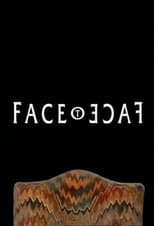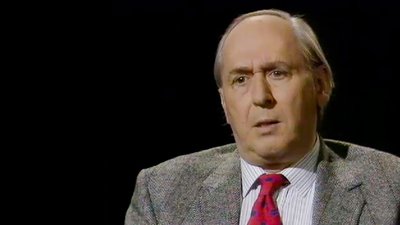
Lord Birkett
Episode 1 • Feb 04, 1959
Face To Face is a BBC television series originally broadcast between 1959 and 1962, created and produced by Hugh Burnett, which ran for 35 episodes. The insightful and often probing style of the interviewer, former politician John Freeman, separated it from other programmes of the time. The series was revived in 1989 with Jeremy Isaacs as the interviewer. This version ran until 1998.
69 episodes total
Status
Ended
First Aired
1959
Rating

8.0/10
2 votes • HD
People
Episodes

Episode 1 • Feb 04, 1959

Episode 2 • Mar 04, 1959
Philosopher Bertrand Russell is the second guest on the series, beginning the interview by reading from a fictitious obituary he'd written for himself. Among the topics discussed are guilt, sex, money, childhood, prison and loss of faith.

Episode 3 • May 06, 1959
John Freeman interviews the first of just two female guests in the series - poet Dame Edith Sitwell. The Dame discusses her unhappy childhood, her working relationship with Dylan Thomas, and her unexpected diversion into Hollywood.

Episode 4 • May 27, 1959

Episode 5 • Jul 15, 1959

Episode 6 • Jul 22, 1959
Adlai Stevenson relives his early life in journalism and law, and discusses losing two Presidential elections to Dwight Eisenhower. Among his other reflections are how others see him, and how he sees himself.

Episode 1 • Sep 18, 1960
Arguably the most famous episode of the series, as Gilbert Harding verges on breaking down under John Freeman's questioning. "I shall be very glad to be dead" remains a poignant response - Harding died less than two months after broadcast.

Episode 2 • Oct 02, 1960
Fridolin von Senger und Etterlin discusses his role in the second World War, including whether he was ever accused of war crimes, and whether he was given any orders he felt were unacceptable.

Episode 3 • Oct 30, 1960
John Freeman talks to a former director-general of his own employer, as ex-BBC head Lord John Reith discusses his early life and time with the corporation. Debated among the two is the value of the BBC in Reith's time, and in the present.

Episode 4 • Nov 13, 1960
John Freeman and Simone Signoret play a verbal game of cat and mouse, as he wants to know "the woman behind the actor's mask." However, Simone is deliberate in what she reveals, answering one question with "I think that's my own business."

Episode 5 • Nov 27, 1960

Episode 6 • Dec 11, 1960
45-year-old John Freeman admits that he's been "consulting some teenage friends of mine" as he interviews his first pop star, Adam Faith. Faith talks about the difference between his showbusiness persona and his real self, Terry Nelhams.

Episode 1 • Oct 15, 1961

Episode 2 • Oct 29, 1961
"It is never easy for one to accept the role of symbolism without going through constant moments of self examination." Martin Luther King discusses his childhood in a segregated America, and the challenges he still faces in the present.

Episode 3 • Nov 12, 1961

Episode 4 • Nov 26, 1961
Jomo Kenyatta discusses his release from prison, and whether there was more he could have done to prevent his incarceration. Also discussed is Kenyatta's vision for the future of Kenya.

Episode 5 • Jan 07, 1962

Episode 6 • Jan 21, 1962

Episode 1 • Mar 21, 1989
In the first of an occasional series of revivals of the classic television interview, Anthony Burgess talks to Jeremy Isaacs. Stirred into writing by the prospect of fatal illness, Anthony Burgess is now regarded as one of the world's most celebrated writers. His novels include A Clockwork Orange, Earthly Powers and his latest, Any Old Iron. The first volume of his autobiography Little Wilson and Big God has been widely recognised as a contemporary masterpiece. Long resident outside Britain, Burgess talks about his life and art - and his attitude to the country of his birth.

Episode 2 • Apr 05, 1989
At the age of 70, Cunningham is perhaps the world's best-known choreographer of modern dance. Since 1953, when he founded his own company, he has been at the forefront of modern experimentation. Cunningham talks about the motivation behind his unflagging creative energy, and his collaborations with artists such as John Cage , Robert Rauschenberg and Andy Warhol.

Episode 3 • May 16, 1989
In the revival of a classic television interview format, Jeremy Isaacs talks to playwright and film director David Hare. From Knuckle to Licking Hitler and Plenty, Hare's work has explored the morality of public and private life in post-war Britain. His current National Theatre play A Secret Rapture and two new films soon to be released, Paris By Night and Strapless, extend these themes of public and personal morality into the Thatcher era.

Episode 4 • May 31, 1989
In a revival of the classic television format, Jeremy Isaacs interviews George Steiner, one of Europe's most eloquent intellectuals.

Episode 5 • Nov 07, 1989
The author of Empire of the Sun and Crash discusses the realities he has created through his work and their interaction with the events of his own life. Ballard talks honestly about the attraction of dark and violent things and the light that these extreme moments can shed on the truth of the human condition. He also explores his early desire to be a psychiatrist and the way in which his interest in the workings of the mind has carried through into the fiction he produces.

Episode 6 • Jan 24, 1990
Jeremy Isaacs talks to American neurologist Oliver Sacks, author of Awakenings and The Man Who Mistook His Wife for a Hat. In this interview he describes how he has turned the case history into literature.
Recommendations
No similar TV shows found.